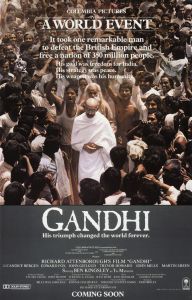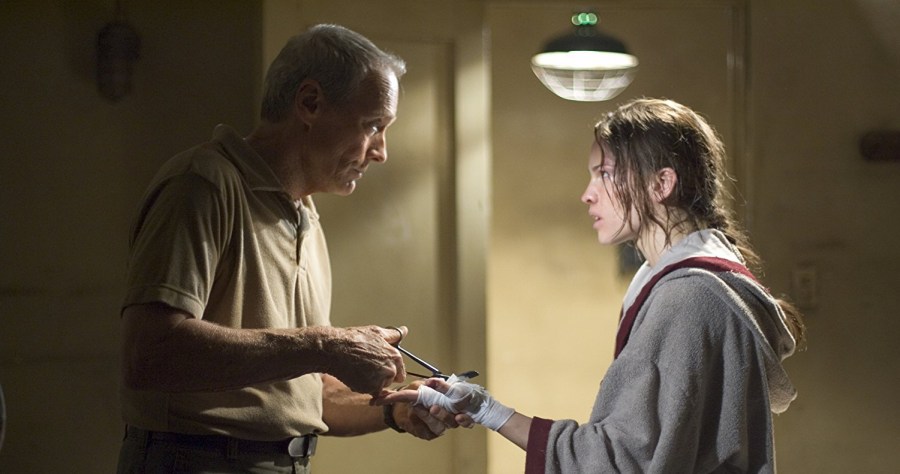So I had grand plans of making a comprehensive ranking of every Academy Award best picture winner at the end of the month. I just have one problem: Apparently even though I’ve watched over 2,500 movies I’ve only seen 63 of the 89 best picture winners. This is hardly surprising given that I tend to have a rather dim view of the Oscars and their ability to actually award the right movies and talent (even as I still watch the ceremony incessantly year after year). But I guess I better get cracking then (side-note: all these movies are at least more than a decade old, so lets just assume that some spoilers may appear):

PLATOON (1986) dir. Oliver Stone
Having recently gone through Ken Burn’s sixteen hour and ten episode treatment of the Vietnam War makes me appreciate Oliver Stone’s Platoon all the more. Drawing from Stone’s own personal experience in Vietnam, the end-result is a movie that is a harrowing and unglamorous look at the war as it follows a platoon through a variety of melees and incidents in the oppressive jungles of Vietnam. One of the most remarkable aspects about the movie is how much it looks just like the actual wartime footage from Vietnam. Before Saving Private Ryan blew all the competition out of the water for realistic wartime footage Platoon truly stands out for its authenticity. But more importantly it is a war movie that best captures the sheer and insane pointlessness of the conflict but in a way that does not diminish the humanity of those who fought for it. It is a movie that clearly understands that before you can make any sweeping statements about the war, you must never forget that a lot of people died in it, and perhaps pointlessly. And by sticking to that axiom and refusing to insert his own commentary in, he ironically might have made his most powerfully political film of all.
Rating: ★★★★½

MILLION DOLLAR BABY (2004) dir. Clint Eastwood
The ultimate problem I had with Million Dollar Baby is that it is a film with two distinct halves that are completely disconnected from one another. The first half is a fairly conventional boxing movie narrative complete with upstart and ambitious amateur Maggie Fitzgerald (Hillary Swank), the gruff and reluctant manager who has a heart of gold (Clint Eastwood), a former veteran who sees something in the girl (Morgan Freeman), and a typical rags-to-riches climb to the very top. Although absolutely no new ground is broken in this half of the film, it is extremely well done and a showcase for all three actors involved. They play believable and fully-formed characters, and the relationships between all three of them are equally compelling. This is crucial because although the first half is a conventional boxing movie, the second half turns into a fully fledged weepie once tragedy strikes the camp and Fitzgerald finds herself a paraplegic after a horrific accident. And even though it is this element of the film that undoubtedly pushed it into the discussion for best picture, it is also the weakest part of the movie. It ramps up the emotion to soap opera levels and is calibrated to wrench as much tears out of the audience as possible. The only thing that keeps the movie from completely flying off the rails is the great character work that was done in the first half which keeps us invested and engaged with them through the soapy finale. The first half of the movie is a pretty good boxing movie with great performances. But that is not why it won best picture. Instead the academy chose to reward it for the absolute worst part of the film.
Rating: ★★★½

GANDHI (1982) dir. Richard Attenborough
At just over three hours in length, Gandhi is exactly the kind of creaky and self-important movie that the Academy fell head-over-heels in love with in the 1980s. Telling the sweeping story of the life of a luminary no less beatific than Mahatma Gandhi, it is the picture-perfect illustration of “Oscar Bait”. That however does not mean that the movie is bad. As portrayed by Ben Kingsley, Gandhi is neither a luminary saint (even if some points of history are glossed over and ignored) nor someone so flawed as to diminish his stature in history. Instead Kingsley finds the quiet right note and anchors the movie to make it much more intimate than its sweeping scope might suggest. Of course apart from Gandhi himself, the film is nothing short of a classic epic with a cast of thousands, spectacular vistas, and a story that spans decades. It is a film that evokes the great epics of David Lean, and would not have felt out-of-place had it been made in the 60’s. But as such it is altogether out-of-touch with the modern sensibilities of its own day, to say nothing of its dated storytelling today. This is both a shame and a relief, because a film of this scope and ambition deserves to be seen but probably only once.
Rating: ★★★★

THE GREATEST SHOW ON EARTH (1952) dir. Cecil B. DeMille
The movie has the reputation of being the worst movie ever to win best picture, and that reputation is both justified and completely unfair. It is justified because it is a completely middlebrow piece of entertainment that represented a safe choice for the academy in the age of McCarthyism when High Noon, with its blacklisted writer, was much more deserving and Singin’ in the Rain, one of the best films ever made, didn’t even get nominated. But it is also an unfair characterization of the movie because as a piece of pure and breezy entertainment, The Greatest Show succeeds. With a cavalcade of stars helmed by Charlton Heston as the general manager of the Ringling and Barnum circus and James Stewart as the sad clown Buttons, the movie is a never-ending string of soapy sub-plots framed by spectacular circus acts aplenty. While the movie had no business whatsoever being in the conversation for best picture, that does not make it deserving of the near-universal scorn that has dogged it since its Oscar win. Taken on its own terms and without too many expectations attached, it is still a good time at the movies.
Rating: ★★★

YOU CAN’T TAKE IT WITH YOU (1938) dir. Frank Capra
On the one hand, it is always a treat when the Academy chooses to reward a movie from one of the “lesser” genres, in this case the screwball comedy. But the problem is that You Can’t Take It With You is hardly the best example of a screwball comedy. It can’t even claim to be the best Frank Capra screwball comedy to win a best picture Oscar (that picture being It Happened One Night). The story set-up is a classic one: A man (Jimmy Stewart) from a rich and high-class family falls in love and wants to marry a woman (Jean Arthur) of a lower-class and altogether eccentric family. The two families decide to meet. Fireworks ensue. But while the set-up is classic screwball, the execution leads much to be desired not least because the pace of this movie is painfully slow in ratcheting up the tension, hijinks, and chaos requisite for a good screwball comedy. At 126 minutes, the movie is about forty minutes too long to wring out the requisite laughs.
Rating: ★★★

MUTINY ON THE BOUNTY (1935) dir. Frank Lloyd
This movie is the perfect embodiment of the classic Hollywood hit. Staring luminaries like Charles Laughton and Clark Gable while telling a story of the sailing on the high seas and the mutiny within makes the movie a spectacle from start to finish. The problem is that the movie’s subject matter is actually a lot grimmer and meaner than the filmmaking might let on. This is a story about a cruel captain who drives his crew to mutiny, and yet it is hard for the movie to portray that cruelty when scenes of torture and punishment are bracketed by the classically romantic and sweeping score. In addition there is a long section in the middle of the movie where the main characters of this film Lieutenant Christian (Gable) and midshipman Robert Byam (Franchot Tone) engage in romantic dalliances with the local Tahitians where their ship has made landing. These shifting of tones from lighthearted to grim despair happen at a whiplash pace that neither of those extremes of the story are entirely convincing. Fortunately the performances all round are fantastic, especially Charles Laughton as the cruel and snivelling captain, and the movie is an effortless watch. The premise of this movie is more than compelling enough to have kept my interest throughout, and it would be interesting to see what a modern director might do with the same material today.
Rating: ★★★★

An interesting mix of Oscar winners. I’m not sure you can find two films as polar opposite as Platoon and The Greatest Show On Earth. I guess it shows the progression of American cinema and, as you suggest, how the Academy can make some strange – even bad – choices.
LikeLiked by 1 person
Pingback: Oscar Best Picture Winners Vol. 2 – Homebody Movies